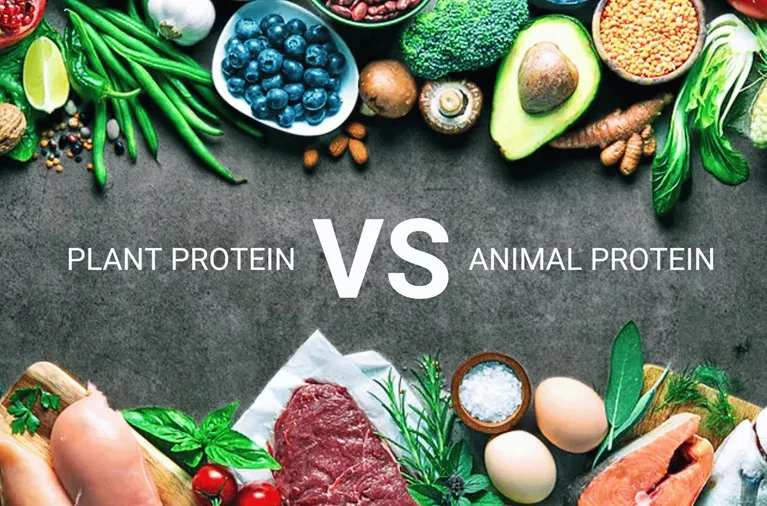The debate surrounding plant versus animal protein has gained significant traction in recent years, fueled by growing health consciousness and environmental concerns. As more individuals adopt vegetarian or vegan diets, understanding the differences between these two protein sources becomes crucial. This article aims to provide a comprehensive analysis of plant and animal proteins, examining their nutritional profiles, health implications, and environmental impacts.
Protein
Protein is a macronutrient essential for the growth, repair, and maintenance of body tissues. It plays a critical role in various bodily functions, including enzyme production, hormone regulation, and immune response. Proteins are made up of amino acids, which are often categorized into essential and non-essential amino acids. The human body can synthesize non-essential amino acids but requires dietary sources for essential amino acids.
Types of Proteins: Complete vs. Incomplete
Proteins are classified as complete or incomplete based on their amino acid profiles:
Complete Proteins: These contain all nine essential amino acids in sufficient quantities. Animal proteins (meat, dairy, eggs) are typically complete.
Incomplete Proteins: These lack one or more essential amino acids. Most plant proteins (grains, legumes, nuts) fall into this category.
However, it is possible to obtain all essential amino acids from a plant-based diet by consuming a variety of foods.
Nutritional Profiles of Plant and Animal Proteins
Animal Protein Sources
Animal proteins are derived from meat, fish, dairy products, and eggs. They are generally rich in:
Essential Amino Acids: All nine essential amino acids are present.
Vitamins and Minerals: High levels of Vitamin B12, iron (heme), zinc, and omega-3 fatty acids (especially in fish).
Saturated Fats: Many animal proteins contain higher levels of saturated fats compared to plant proteins.
Common Sources:
- Beef
- Chicken
- Pork
- Fish
- Eggs
- Dairy products (milk, cheese, yogurt)
Plant Protein Sources
Plant proteins come from vegetables, grains, legumes, nuts, and seeds. They are typically high in:
Fiber: Essential for digestive health.
Phytonutrients: Antioxidants that may reduce disease risk.
Unsaturated Fats: Generally lower in saturated fats than animal sources.
Common Sources:
- Legumes (beans, lentils)
- Nuts and seeds (almonds, chia seeds)
- Whole grains (quinoa, brown rice)
- Soy products (tofu, tempeh)
Health Implications of Plant vs. Animal Protein
Benefits of Plant Protein
1. Heart Health: Diets rich in plant protein have been associated with lower risks of heart disease due to lower saturated fat content and higher fiber intake.
2. Weight Management: Plant-based diets tend to be lower in calories and higher in fiber, promoting satiety and aiding weight loss.
3. Diabetes Prevention: Studies suggest that plant protein can help regulate blood sugar levels and reduce the risk of type 2 diabetes.
4. Cancer Risk Reduction: High intake of fruits and vegetables has been linked to a decreased risk of certain cancers.
Concerns with Plant Protein
1. Amino Acid Profile: Some plant proteins may lack one or more essential amino acids. However, combining different plant sources can provide a complete amino acid profile.
2. Nutrient Deficiencies: Those on strict plant-based diets may need to supplement vitamins such as B12 and D or minerals like iron and calcium.
Benefits of Animal Protein
1. Muscle Mass Maintenance: Animal protein is often considered superior for muscle synthesis due to its complete amino acid profile.
2. Nutrient Density: Provides essential nutrients like Vitamin B12 and heme iron that are more readily absorbed by the body.
3. Satiety: Animal proteins can promote feelings of fullness due to their higher fat content.
Concerns with Animal Protein
1. Health Risks: High consumption of red and processed meats has been linked to increased risks of heart disease, certain cancers, and other chronic conditions.
2. Saturated Fats: Diets high in saturated fats can contribute to elevated cholesterol levels.
See Also: When Should You Ice Your Face In Skincare Routine?
Environmental Impact
The environmental consequences of protein sources are increasingly relevant in today’s climate-conscious society.
Animal Agriculture’s Footprint
1. Greenhouse Gas Emissions: Livestock farming is a significant contributor to greenhouse gas emissions.
2. Resource Intensive: Raising animals for food requires substantial land, water, and feed resources.
3. Biodiversity Loss: Expanding agricultural land for livestock contributes to habitat destruction.
Plant-Based Diet Benefits
1. Lower Emissions: Plant-based diets generally result in lower greenhouse gas emissions compared to meat-heavy diets.
2. Resource Efficiency: Growing plants for direct human consumption is often more efficient than raising animals for food.
3. Sustainable Practices: Many plant-based farming practices can enhance soil health and biodiversity.
Conclusion
The choice between plant and animal protein ultimately depends on individual health goals, ethical considerations, and environmental awareness. A balanced diet that incorporates both protein sources may provide the best nutritional benefits while also considering sustainability. Consider incorporating more plant-based proteins into your diet while being mindful of nutrient intake. If consuming animal proteins, choose leaner cuts and limit processed meats. By understanding the advantages and disadvantages of each protein type, individuals can make informed dietary choices that align with their health objectives and values.
Related Topics


































